Links to external sources may no longer work as intended. The content may not represent the latest thinking in this area or the Society’s current position on the topic.
The impact of the 2015/2016 El Niño on the terrestrial tropical carbon cycle: patterns, mechanisms and implications
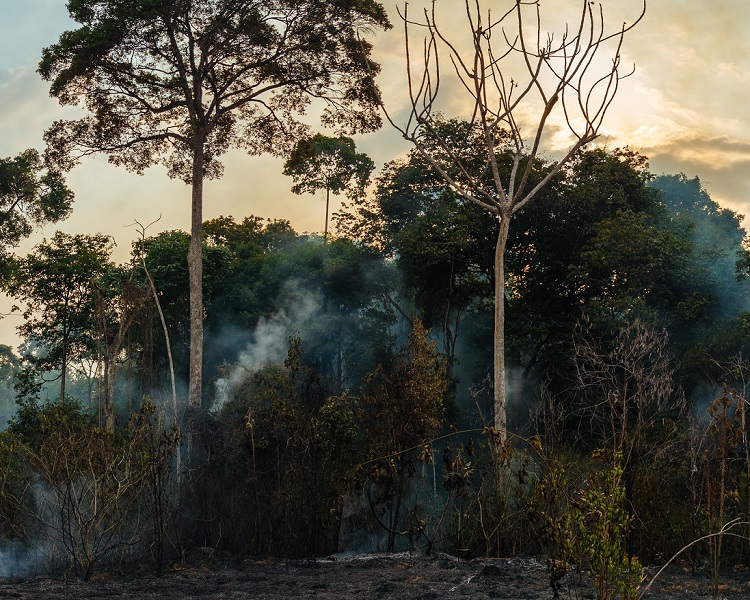
Scientific discussion meeting organised by Professor Yadvinder Malhi, Dr Rosie A. Fisher, Dr Luiz E.O. Aragão and Dr Lucy Rowland.
The El Niño of 2015/2016 was one of the strongest tropical climate events for a century. This meeting will gather an international and multidisciplinary community of scientists to describe and understand how the terrestrial tropics responded to the El Niño, and what this can tell us about future stability of the tropics and the global carbon cycle under climate change.
Attending this event
This meeting has taken place.
Meeting papers will be published in a future issue of Philosophical Transactions B.
Enquiries: contact the Scientific Programmes team
Schedule
| 09:00 - 09:10 | Welcome by the Royal Society and Yadvinder Malhi FRS | |
|---|---|---|
| 09:10 - 09:35 |
Physical aspects of the 2015/16 El Niño and its historical context
The 2015/16 El Niño ranked in the top three major events of the late 20th - early 21st century. Every El Niño event is subtly different from the last one and this talk will cover the main features of the physical climate system during 2015/16 and contrast those to previous events. It will cover patterns of Sea Surface Temperature and their predictability, together with other important atmosphere and ocean variables. The role of climate change in modifying both El Niño itself and its impact on the physical climate system will be discussed. 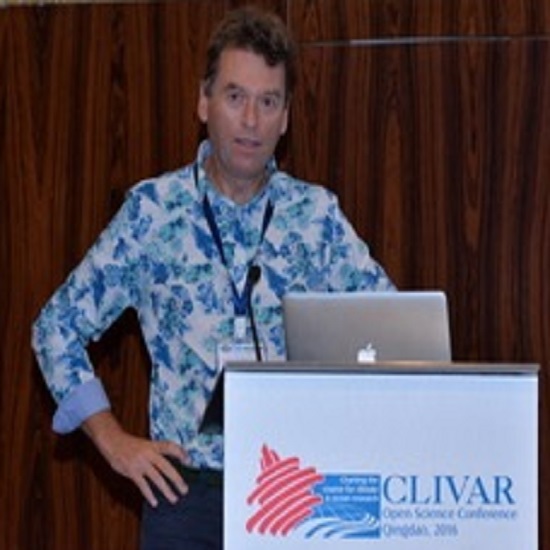
Professor Mat Collins , University of Exeter, UK

Professor Mat Collins , University of Exeter, UKMatthew Collins is Joint Met Office Chair in Climate Change in the College of Engineering, Mathematics and Physical Sciences at the University of Exeter. His research interests are in climate modelling, quantifying uncertainty and probabilistic climate prediction, seasonal to decadal climate predictability and in understanding climate variability, especially ENSO. He currently leads the NERC-funded “Robust Spatial Projections of Real-World Climate Change” project (Large Grant Scheme). He has been a contributing author on two of the most recent IPCC reports (TAR and AR4) and was a Coordinating Lead Author on the IPCC AR5. He is the co-chair of the newly formed CLIVAR Climate Dynamics panel. He is a member of the scientific steering committee of the Indian Institute of Tropical Meteorology and a member of the steering committee for the UK Climate Projections 2018 project. From March 2016 he has been an editor of the Journal of Climate. |
|
| 09:35 - 09:55 |
Spatial patterns of temperature and drought anomalies associated with the 2015/2016 El Niño
Large year-to-year variability in the ecological functioning of tropical ecosystems influences the atmospheric CO2 growth rate and thus the pace of anthropogenic global warming. El Niño-Southern Oscillation (ENSO) is considered to be the primary driver of the interannual variability of the tropical carbon sink. Previous studies have identified anomalous warming over the Amazon forests associated with Sea Surface Temperature (SST) anomalies in the tropical Pacific (EN region) and the tropical Atlantic, but global interannual variations in SST are also linked to anomalies in vegetation greenness, land surface temperature and precipitation worldwide. Hence, it is expected an intensification of the dry season over African forests, with the drying associated with enhanced sea surface warming over the Indian Ocean together with warming in the tropical North Atlantic. In this context, the ENSO also plays a key role for the climate of Asian forests, added to the influence of the monsoon. The recent 2015/2016 EN event was considered as strong as the EN of the century in 1997/1998, and it was expected to be related to unprecedented warming and extreme drought in Amazonia. This talk will discuss the spatial patterns of surface temperature anomalies and drought over tropical forests (Amazonia, Africa, Indonesia) during the 2015/2016 EN event. These spatial patterns of warming and drought will be compared to spatial patterns observed in other strong EN events and other severe drought episodes. The link between warming and drought and SST anomalies over different sea regions will be also explored. Finally, discrepancies observed between different climate datasets will be also discussed. 
Dr Juan Carlos Jimenez, University of Valencia, Spain

Dr Juan Carlos Jimenez, University of Valencia, SpainJuan C Jimenez is an Associate Professor in the Department of Earth Physics & Thermodynamics (Faculty of Physics) at University of Valencia. He conducts his research in the Global Change Unit of the Image Processing Laboratory at University of Valencia. His research focuses on thermal infrared remote sensing using Earth Observation sensors on board satellites, with particular emphasis on the development of algorithms for Land Surface Temperature retrieval and calibration/validation of LST products. Other research interests include retrieval of evapotranspiration, soil moisture and analysis of surface urban heat island. His recent research efforts are primarily focused on using remote sensing and reanalysis data to analyse the warming trends and drought patterns over tropical forests (with emphasis on Amazonia) driven by climatic factors such as ENSO or sea surface temperature anomalies over other oceanic regions. |
|
| 09:55 - 10:15 | Discussion: What were the climatic characteristics of the 2015/2016 El Niño? | |
| 10:15 - 10:35 | Coffee |
| 10:35 - 11:00 |
El Niño and predictability of an anomalous CO2 rise

Professor Richard Betts, Met Office Hadley Centre and University of Exeter, UK

Professor Richard Betts, Met Office Hadley Centre and University of Exeter, UKProfessor Richard Betts is Chair in Climate Impacts at the University of Exeter and Head of Climate Impacts Research at the Met Office Hadley Centre. His research focusses on interactions between climate, land ecosystems and the carbon and hydrological cycles. He has been involved in a number of pioneering advances in Earth System modelling and quantifying the influences of human-induced land cover changes on climate and the impacts of climate change on global ecosystems. He was a Lead Author on the IPCC Fourth and Fifth Assessment Reports, first in Working Group 1 (Physical Science Basis) and then Working Group 2 (Impacts, Adaptation and Vulnerability). He was also a lead author on the Millennium Ecosystem Assessment, contributed to the First and Second UK Climate Change Risk Assessments, and was an expert reviewer of the Stern Review. Richard is currently coordinator of the EU-funded project HELIX (High-End cLimate Impacts and eXtremes). |
|
|---|---|---|
| 11:00 - 11:25 |
The global carbon cycle impacts of the 2015/2016 El Niño as seen through atmospheric and surface-ocean data
The strongest mode of variation in the natural global carbon cycle (comprising the exchange fluxes of CO2 between atmosphere, land biosphere, and ocean) is tightly linked to ENSO variability. Interannual CO2 flux variations can be quantified from multi-year observations of atmospheric CO2 mixing ratios or of surface-ocean CO2 partial pressure (pCO2). The talk will present such data-based estimates of CO2 flux variations during the 2015/2016 El Niño event, and compare them to the variations during previous El Niño events. Simple statistical models will be used to discuss how "special" the carbon cycle response to the 2015/2016 El Niño was in the historical context. 
Max Planck Institute for Biogeochemistry, Jena, Germany

Max Planck Institute for Biogeochemistry, Jena, Germany |
|
| 11:25 - 11:50 |
Tropical land carbon cycle responses to El Niño as recorded by atmospheric greenhouse gas data

Professor Emanuel Gloor, University of Leeds, UK

Professor Emanuel Gloor, University of Leeds, UKEmanuel Gloor is a Physicist by training (ETH Zürich, Switzerland). His research focuses on the global carbon cycle and related cycles (eg methane), and the response of these cycles to a changing climate. Some of his research focusses on the tropics and in particular Amazonia. He has led a NERC consortium (AMAZONICA) which focused on understanding the resilience of Amazonian forests. One of the components of AMAZONICA was initiation of a basin-wide lower-troposphere greenhouse gas monitoring program over the Amazon together with Luciana Gatti and John Miller, which continues until today. These data are the basis of the presentation at this meeting. He is also involved in studies aiming at understanding limits of functioning of tropical forests based on on-ground measurements and targeted experiments. |
|
| 11:50 - 12:15 |
Responses of tropical terrestrial biosphere carbon cycle to the 2015-2016 El Niño as seen from space
The 2015-2016 El Niño, one of the strongest since the 1950s, led to historic high temperature and low precipitation over the tropics while the atmospheric CO2 growth rate was the largest on record. The launch of the Orbiting Carbon Observatory-2 (OCO-2) shortly before the 2015-2016 El Niño event provides an opportunity to understand how tropical land carbon fluxes respond to the warm and dry climate characteristics of the El Niño conditions. The El Niño events may also provide a natural experiment to study the response of tropical land carbon fluxes to future climate, since anomalously warm and dry tropical environments typical of El Niño are expected to be more frequent under most emission scenarios. This talk will present clear evidence as seen by OCO-2 that the large release of carbon from tropical land regions was the driver of the large atmospheric CO2 growth during 2015-2016 El Niño. Though the three tropical regions contributed roughly the same amount to the growth in global atmospheric CO2 in 2015, temperature and rainfall changed in different ways on each region because of the El Nino. Tropical South America and tropical Asia experienced drought and heat, while tropical Africa only had high temperature. Correspondingly, the carbon cycle responded to these changes in very different ways: GPP reduced (0.9 ± 0.97 GtC) in tropical South America, fire increased (0.4 ± 0.10 GtC) in tropical Asia, and respiration increased (0.6 ± 1.01 GtC) in Africa. The net carbon fluxes and its components were optimized with a model data assimilation framework that integrates observations from multiple streams. Our results imply a positive carbon-climate feedback if the frequency of El Niño-like climate anomaly increase in the future. 
Dr Junjie Liu, Jet Propulsion Laboratory, Nasa, USA

Dr Junjie Liu, Jet Propulsion Laboratory, Nasa, USA |
|
| 12:15 - 12:40 |
The impact of the 2015/2016 El Nino on atmospheric carbon as observed from space
The El Niño in 2015/2016 was the first major pan-tropical climate variation observed by satellite sensors that measured a range of relevant atmospheric, terrestrial, and ocean properties. We will tell the story of this El Niño as it unfolded from the perspective of column CO2 measurements from the NASA OCO-2 and the Japanese GOSAT satellite instruments. This talk will interpret these data using coincident space-borne measurements of leaf phenology, hydrology, and fire. 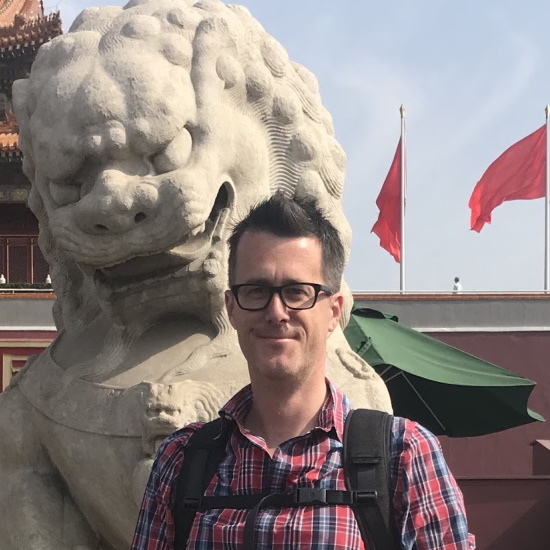
Professor Paul Palmer, University of Edinburgh, UK

Professor Paul Palmer, University of Edinburgh, UKPaul Palmer is a Professor at the University of Edinburgh. His research is focused on understanding the physical and chemical processes that drive variations in the atmospheric composition of Earth, embracing data, models, and theory. He has pioneered new methods to interpret satellite observations of reactive trace gases and particles and greenhouse gases. In recent work relevant to this discussion meeting, his group has revealed the importance of eastern African wetlands as a globally relevant source of methane. He is also the science director of the NERC National Centre for Earth Observation and a Distinguished Visiting Scientist at the Jet Propulsion Laboratory. He is a science team member of NASA and Japanese satellite instruments that measure atmospheric GHGs and is the UK co-lead of the French-UK MicroCarb satellite mission. He sits on the European Commission CO2 Task Force that is delivering information to support Europe’s response to the Paris Agreement. |
|
| 12:40 - 13:10 | Discussion: What do the atmospheric and ocean surface signals tell us about the net terrestrial biosphere response to El Niño? |
| 14:00 - 14:25 |
Simulating the carbon cycle impact of the El Niño in TRENDY biosphere models
El Nino Southern Oscillation (ENSO) is the main mode of variability of the global carbon cycle. Typical, El Niño years are characterized by larger than average atmospheric CO2 growth rate, mainly attributed to large anomalies in terrestrial carbon uptake (via plant photosynthesis) and/or release (via soil organic decomposition and fires). The 2015-2016 El Niño is considered to be one of the three strongest recent El Nino events (together with 1982-83 and 1997-98). 
Professor Pierre Friedlingstein , University of Exeter, UK

Professor Pierre Friedlingstein , University of Exeter, UKProfessor Pierre Friedlingstein is a Royal Society Wolfson Research Merit recipient, he holds a Chair in Mathematical Modelling of the Climate System at the University of Exeter. He is also, currently on leave, Research Director at the Centre National de la Recherche Scientifique (CNRS), France. He has 25 years research experience in the field of global carbon cycle modelling, global biogeochemical cycles and global climate change and published over 120 peer-reviewed articles including 35 in Nature journals, Science or PNAS. He has been a Thompson Reuters Highly cited researcher every year since 2014. He developed dynamic global vegetation models (DGVM) in order to investigate the role of terrestrial ecosystems in the global carbon cycle at multiple time scales. He was one of the first who used a terrestrial carbon cycle model to estimate the changes in land carbon content over glacial-interglacial cycles. He pioneered the science of climate and carbon cycle feedbacks, proposing an original mathematical framework for feedback analysis. His C4MIP paper, published in Journal of Climate in 2006, is in the most cited papers on carbon cycle or climate change since its publication (>1300 citations). He coordinates the coupled climate carbon cycle intercomparison project (C4MIP). He is member of the Working Group on Climate Modelling (WGCM) of WCRP as is past member of Global Carbon Project (GCP). He is actively involved in climate assessment through his participation in the Intergovernmental Panel on Climate Change (IPCC) since 1994. He was lead author for the IPCC Fifth Assessment Report for both Working group I and for the Synthesis Report. |
|
|---|---|---|
| 14:25 - 14:50 |
Simulating the impact of the El Niño in tropical forests – results from the NGEE Tropics Programme
Simulating the response to the 2015/2016 El Niño event presents a test case for land surface models in their ability to correctly determine the drought severity at which ecosystems exhibit loss of function (gas exchange reduction, impacts on growth, and ultimately tree mortality). These properties are the complex emergent results of a large suite of model assumptions and boundary conditions. One such condition is the ecosystem composition prior to the drought event, represented in terms of the functional traits of the plant types that comprise the modeled system. This talk will present results from the Functionally Assembled Terrestrial Ecosystem Simulator (FATES) that specifically investigate the impacts of variation in plant trait representation. FATES is a community modeling tool developed under the auspices of the Next Generation Ecosystem Experiment in the Tropics. Here we drive v1 of FATES for Amazonia using the TRENDY project boundary conditions, and illustrate impacts on ecosystem function for a range of observationally plausible scenarios. Other test cases of FATES within the NGEE-T project will also be presented herein. 
Dr Rosie Fisher, Terrestrial Sciences Section Climate and Global Dynamics National Center for Atmospheric Research, USA

Dr Rosie Fisher, Terrestrial Sciences Section Climate and Global Dynamics National Center for Atmospheric Research, USADr Rosie Fisher works on carbon cycle process representation in Earth System Models, primarily via coordinating developments of the Community Land Model, most recently those concerned with nutrient cycling, and the representation of plant demographic processes, community assembly and vegetation dynamics. She has worked in the tropics on rainfall exclusion experiments, and is the co-lead of modeling activities in the US Department of Energy Next Generation Ecosystem Experiment in the tropics. Her other interests include fire-vegetation dynamics, parametric sensitivity and plant drought physiology. |
|
| 14:50 - 15:10 | Discussion: How well do biosphere carbon cycle models match the observed atmospheric anomaly? What are the key process uncertainties? | |
| 15:10 - 15:40 | Tea |
| 15:40 - 16:05 |
Carbon cycle responses to the El Niño in forests from a global intensive carbon cycle monitoring network
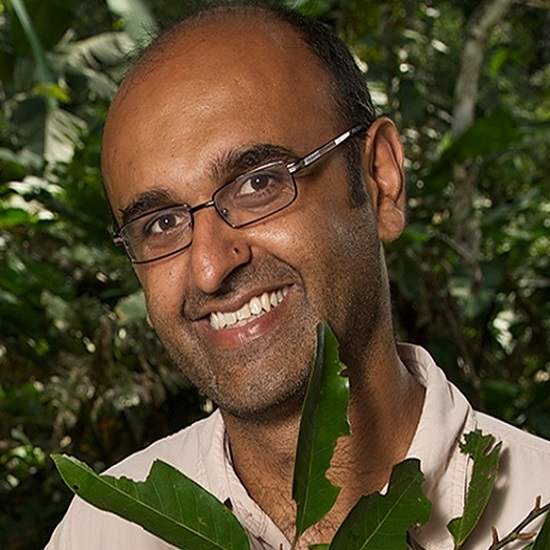
Professor Yadvinder Malhi FRS, University of Oxford, UK

Professor Yadvinder Malhi FRS, University of Oxford, UKYadvinder Malhi is an ecosystem ecologist who has advanced our understanding of the functioning of terrestrial ecosystems and how they are responding to the pressures of global change, including climate change, degradation and loss of large animals. This work integrates insights from ecosystem ecology into Earth System science, and has been characterised by a multidisciplinary approach that involves establishing broad networks of field research in tropical forests in some of the most remote and challenging regions of the world, and also application of micrometeorological approaches, global climate datasets, terrestrial ecosystem models and satellite remote sensing. This work has contributed to our understanding of the carbon sink in the terrestrial biosphere, and to how it may be vulnerable to climate warming. His interests extend to a broad understanding of contemporary change in the biosphere and how to navigate it, through a combination of natural sciences, social sciences and policy approaches. |
|
|---|---|---|
| 16:05 - 16:30 |
Temperature and moisture effects on carbon-climate feedbacks from tropical forests
By the end of this century the rapid warming of Earth’s climate system will push tropical forest biomes to high temperature states that have not occurred for many thousands, if not millions, of years. This rapid warming will also drive an increase in the intensity and duration of drought across large tropical regions. These no-analog climates will drive differential tree mortality related to successful survivorship responses, resulting in future tropical forests with uncertain structure and dynamics, and destabilizing feedbacks to the climate system. This talk will examine a set of ecophysiological and biochemical responses that are induced to enable plant survival under extreme climate conditions, and explore how those responses may vary with key plant functional traits. Results will focus on research conducted in Amazon forests. 
Dr Jeffrey Chambers, University of California, USA

Dr Jeffrey Chambers, University of California, USAJeff Chambers is an Associate Professor in the Geography Department, University of California, Berkeley, and a Faculty Scientist in the Climate and Ecosystem Sciences Division at Lawrence Berkeley National Laboratory. His research is focused on terrestrial ecosystem ecology, tropical forests and climate change, disturbance and recovery processes, vegetation dynamics, and land-atmosphere interactions. Methods employed to address these questions include ecological and physiological field measurements, remote sensing image analysis, and simulation modeling. Much of his work has taken place over more than 20 years in Amazon forests, in collaboration with scientists and students at Brazil's National Institute for Amazon Research (INPA). |
|
| 16:30 - 17:00 | Discussion: How closely to observations of the tropical biosphere response to the El Niño match observations? Have there been any important surprises? Can the observational data improve representation of critical processes in biosphere models? |
| 09:00 - 09:30 |
The impacts of the El Niño on fire occurrence and carbon emissions
El Niño episodes lead to longer and more intense dry seasons in many tropical forest regions. These drought events enabled humans to use fire more effectively as a tool in the deforestation process, and satellites detect increased fire activity and atmospheric levels of many pollutants during and following El Niño in a consistent pattern that has started to appear around the 1970s. Equatorial Asia (mostly Indonesia) is first impacted in the El Niño cycle, followed by Southeast Asia, Central America, and the Amazon. In general, fire activity in the global tropical forests doubles with the largest impact in equatorial Asia. Here, drying of drained peatlands leads to almost endless amounts of fuel that can burn for months until the wet season starts and deteriorates air quality in a densely populated region. Total greenhouse gas emissions from these fires exceed those from fossil fuel emissions, not only in Indonesia but also in many South American countries. While the 2015 El Niño was almost at strong as the one in 1997, fire emissions were substantially lower and did not impact the global growth rate of greenhouse gases as markedly, partly due to a different progression of the dry season in Indonesia and decreased vulnerability to fire in some Amazonian regions. 
Dr Guido van der Werf, Vrije Universiteit, The Netherlands

Dr Guido van der Werf, Vrije Universiteit, The NetherlandsDr Guido van der Werf received his PhD in 2006 from the Vrije Universiteit, Amsterdam based on work carried out at NASA Goddard Space Flight Center (GSFC). He is interested in the global carbon cycle and specifically the role of fires and deforestation therein, including the climate impact of fires. His group, funded by ERC, EU, and national grants uses satellite data, atmospheric modelling, and field measurements and bridges local and global scale research. |
|
|---|---|---|
| 09:30 - 09:55 |
The impact of El Niño on Amazonian droughts and forest fire carbon emissions

Dr Luiz Aragao, National Space Research Institute, Brazil

Dr Luiz Aragao, National Space Research Institute, BrazilLuiz Aragão is a scientist at the Brazilian Institute for Space Research (INPE). He is the leader of the Tropical Ecosystems and Environmental Sciences Laboratory. He is an expert in remote sensing of tropical ecosystem and has worked in Amazonia since 1998. He has published over 100 papers (H-index 35), that has been cited more than 4,400 times about the impacts of environmental changes on Amazonian climate, fire patterns and carbon cycle. Dr Aragão is currently investigating the effects of forest degradation by fire on the carbon budget of Amazonia. |
|
| 09:55 - 10:20 |
The effect of fire on the carbon cycle of Amazonian forests

Dr Erika Berenguer, University of Lancaster, UK

Dr Erika Berenguer, University of Lancaster, UK |
|
| 10:20 - 10:50 | Discussion: What are the relative roles of fire and ecophysiology in explaining the tropical carbon cycle response to the E Niño? | |
| 10:50 - 11:20 | Coffee |
| 11:20 - 11:55 |
El Niño impacts in the Australian tropics
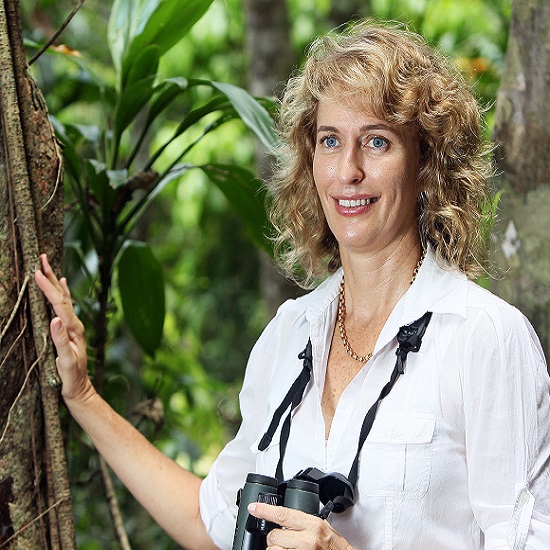
Associate Professor Susan Laurance, James Cook University, Australia

Associate Professor Susan Laurance, James Cook University, AustraliaSusan Laurance is an Australian Research Council Future Fellow, Scientific Director of the Daintree Rainforest Observatory and Past-President of the Association for Tropical Biology and Conservation. Susan is a field biologist whose primary research focus is on understanding the vulnerability of tropical plant and wildlife communities to land-use and climate-change phenomena. Her research has a strong conservation emphasis. Currently she is leading three major research programs: the Daintree Drought Experiment in the lowland humid rainforest of tropical Australia; a chronosequence study on secondary forest regeneration, and a landscape epidemiology project that explores how human land-use influences disease dynamics. Susan is an Associate Professor at James Cook University where she lectures on Rainforest Ecology, Conservation Biology and Restoration Ecology. |
|
|---|---|---|
| 11:55 - 12:20 |
Insights from long-term drought experiments in the tropics
El Niño events tend to impact Amazonian forest with positive temperature anomalies and strong negative rainfall anomalies. The net effect is to impose drought and heat stress on the forest. The frequency of strong drought events in parts of Amazonia may increase in the future, and indeed elsewhere across the global tropics, with potentially large impacts on climate services in relation to carbon storage and transpiration, and in relation to tree mortality and biodiversity. Understanding and predicting how tropical rainforest responds to drought extremes requires field measurements to provide information about the underlying mechanisms. This information can be used to enable advances in predictive land-surface models. These data have historically been vary sparse. Rainfall manipulation treatments provide unique scientific leverage by experimentally imposing a drought treatment, reducing soil moisture availability. We report on results from the world’s only long-term, ecosystem-scale drought experiment in tropical rainforest, led through a 20 year collaboration between UK and Brazilian scientists. We consider evidence from the effects of short and long term soil moisture reduction (equivalent to a 50% reduction in rainfall over >15 years). We address uncertainty in how resistant eastern Amazon rainforest is to drought, and whether we can expect recovery from drought impacts. We consider how the evidence from this experiment can inform understanding of short-term El Niño impacts on vegetation and climate, and over the longer term, as drought stress may increase in both punctuated and secular patterns, partly related to a potential increase in the frequency of El Niño events. 
Professor Patrick Meir, Australian National University, Australia and University of Edinburgh, UK

Professor Patrick Meir, Australian National University, Australia and University of Edinburgh, UKPatrick Meir is Professor of Tropical Forest Ecosystems at the Australian National University, and Chair of Ecosystem Science at the University of Edinburgh. He has over 20 years’ experience in tropical forest science. He has pioneered multiple experimental and observational studies to advance understanding and modelling of the functional properties of tropical forests of their response to changes in climate, nutrient availability, atmospheric carbon dioxide concentration, and land use change, and of how these responses intersect with biodiversity. Patrick leads the world’s only long-term drought experiment in tropical rainforest, in the eastern Amazon, has published on forests from all major tropical regions, and has current studies in South America, SE Asia and Australia. |
|
| 12:20 - 12:45 |
The role of drought in modulating forest transpiration and altering water cycling in tropical forests
Transpiration from the Amazon rainforest generates an essential water source at a global and local scale. However, changes in rainforest function during drought events can disrupt this process, causing significant reductions in precipitation across Amazonia, and potentially at a global scale. Using a long-term (>10 year) experimental drought treatment in Amazonian forest as a case study we explore how drought events can alter transpiration and forest water cycling in tropical rainforests. We find that after 15 years of receiving half the normal rainfall forest transpiration decreased by 30%, driven mostly by drought-induced tree mortality. The droughted trees which survived, actually maintained or increased transpiration despite the continued drought, because of reduced competition for water and increased light availability, which is consistent with increased growth rates. Consequently, the amount of water supplied as rainfall reaching the soil and directly recycled as transpiration increased to 100%. This value was 25% greater than for adjacent non-droughted forest. If these drought conditions were accompanied by even a modest increase in temperature and VPD, such as those which typically occur during El Niño events water demand would dramatically exceed supply, making the forest more prone to increased tree mortality. Considering future predictions of drying climates across many tropical regions, the combined effects of long-term changes in climate and El Niño style drought events on water cycling must be considered when making future predictions of tropical forest mortality. 
Dr Lucy Rowland, University of Exeter, UK

Dr Lucy Rowland, University of Exeter, UKDr Rowland is a NERC independent research fellow and lecturer at the University of Exeter. She undertook her PhD at the University of Edinburgh 2009-2013, which focused on integrating empirical data with vegetation modelling to understand tropical forest responses to climate change. Following this she undertook two post-doc positions at the University of Edinburgh and Exeter focussed on measuring and then modelling tropical forest drought responses. Currently Dr. Rowland specialises in understanding how tropical forests respond to climatic stress and how plant functional traits interact to modulate these responses. Her recent work has focused on the role of plant hydraulic traits in modulating ecosystem function at a long-term drought experiment in north-east Brazil and in tropical forests located across rainfall gradients in South America, Africa and Asia. Dr. Rowland also specialises in using this empirical data to implement new plant hydraulic schemes and forest drought responses in global vegetation models. |
|
| 12:45 - 13:10 |
The ecophysiological response of a Bornean rainforest to El Niño drought
This presentation assesses the response of a South East Asian moist tropical forest to the 2016-2017El Niño drought, at the tree and forest ecosystem scale. On a typical year, the region does not have clear dry and wet seasons, but experiences high levels of rainfall throughout the year. Thus, occasional but severe droughts may cause significant changes in the functioning these forests. We monitored the tree physiology and forest ecosystem carbon dynamics in an intensive carbon plot and with an eddy covariance tower at the SAFE Project site in Sabah, Malaysian Borneo. We observed a clear decline in above-ground woody productivity and sap flow rates during the peak drought. The ecosystem gross primary productivity showed a marked decrease during the drought, as a result of a decrease in both leaf-level photosynthesis and ecosystem-level leaf area index. Ecosystem respiration decreased, mainly due to reduced autotrophic respiration, while heterotrophic respiration was less sensitive. The ecosystem was resilient, with the processes returning to pre-drought levels in two to six months post-drought. Intensive monitoring of multiple processes at different spatial scales increases our understanding on the forest ecosystem functioning during water stress. 
Dr Terhi Riutta , University of Oxford and Imperial College London, UK

Dr Terhi Riutta , University of Oxford and Imperial College London, UKTerhi Riutta is an ecosystem ecologists specialised in forest carbon dynamics and productivity. Her current research focuses is the effect of forest degradation and deforestation on carbon stocks and fluxes in Malaysian Borneo. She did her PhD in the University of Helsinki, Finland, studying peatland carbon dynamics. Terhi is currently a research associate in the Imperial College London and the University of Oxford. |
| 14:00 - 14:25 |
El Niño impacts on African tropical forests

Professor Simon Lewis FRS, University College London and University of Leeds, UK

Professor Simon Lewis FRS, University College London and University of Leeds, UKSimon L Lewis is Chair of Global Change Science at University College London and the University of Leeds. Professor Lewis is a tropical field ecologist who studies global environmental change. Professor Lewis studies how the world’s tropical forests have been responding to environmental change, including that intact tropical forests have been absorbing globally significant quantities of carbon dioxide over recent decades, slowing climate change. He later revealed that this uptake is now in decline. Professor Lewis’ team recently described and mapped a new ecosystem type to science, the central Congo peatlands, spanning 16.8 million hectares. Subsequently, he uncovered its threshold behaviour, absorbing carbon when the climate is wetter and releasing it when drier; a new feedback in the global carbon cycle. |
|
|---|---|---|
| 14:25 - 14:50 |
Opportunities and challenges in understanding and modeling tropical forest mortality
Tree mortality appears to be increasing in moist tropical forests (MTFs) and could have significant consequences for the global carbon cycle. We review the state of knowledge regarding the drivers of MTF tree mortality, identify if these drivers are strengthening over time and possibly causing increased tree death, and identify next steps for improved understanding and reduced model uncertainty. Increasing mortality rates are associated with rising temperature and vapor pressure deficit, liana abundance, droughts, wind events, fire, and possibly CO2 fertilization-induced increases in stand thinning or acceleration of trees reaching larger, more vulnerable heights. These mortality drivers alter plant physical structure or physiological processes such as carbon starvation and hydraulic failure. The relative importance of each driver is unknown and is thus a major knowledge gap. High species diversity may buffer MTFs against large-scale mortality events relative to the extratropics, but the historical and expected trends in mortality drivers give reason for concern regarding increasing mortality within tropical forests. Models of tropical tree mortality are advancing representation of hydraulics, carbon, and demography, but require more empirical knowledge regarding the most common drivers and their subsequent mechanisms. 
Dr Nate McDowell, Pacific Northwest National Lab, USA

Dr Nate McDowell, Pacific Northwest National Lab, USA |
|
| 14:50 - 15:20 | Discussion: Can the observed response to the El Niño inform us about the resilience or vulnerability of the tropical biosphere to extreme events? | |
| 15:20 - 15:50 | Tea |
| 15:50 - 16:15 |
Fire-mediated impacts on biodiversity and ecosystem functioning in eastern Amazonia
While wildfires are considered a major threat to rainforests, our understanding on how fires during El Niño events affect tropical forest biodiversity and functioning is severely constrained by the lack of research with pre-fire controls or assessing how these fires fires interact with other human-driven forest disturbances. This talk will assess the fire impacts on dung beetle communities, and associated ecological functions (dung removal, soil bioturbation and seed dispersal) sampled along a previous gradient of human forest disturbances including undisturbed, logged, and logged-and-burned forests in the eastern Brazilian Amazon. Data was collected following the same methodologies in 2010 (six years before fires), 2016 and 2017 (six months and one year after fires, respectively). Negative fire-mediated impacts were found for all examined metrics sampled within all forest classes. Dung beetle species richness, abundance and biomass decreased at both burned and unburned forests sampled after fires, with a slightly recover observed only for communities sampled in 2017 within previously undisturbed forests that were not burned during the last El Niño. These patterns were congruent across distinct dung beetle feeding guilds and for ecological functions. As previously undisturbed forests had greater resilience to fire, our findings bring insights that previous human disturbances can influence the post-fire recovery of tropical fauna and associated ecological processes. 
Professor Jos Barlow , University of Lancaster, UK

Professor Jos Barlow , University of Lancaster, UKJos Barlow is interested in understanding how human activities impact tropical forest biodiversity, and the ecosystem services and functions that biodiversity delivers. He has been working in the Brazilian Amazon since 1998, assessing the ecological consequences of wildfires, selective logging and landscape fragmentation. He is interested in finding management solutions to seemingly intractable development-environment issues, such as the role of fire-use in Amazonian agriculture. He was one of three co-founders of the inter- and trans-disciplinary Sustainable Amazon Network which involves >100 researchers and stakeholders, and is editor-in-chief of Journal of Applied Ecology. |
|
|---|---|---|
| 16:15 - 17:00 | Synthesis discussion: Putting the pieces together. What have we learned from the 2015/2016 El Niño? |
